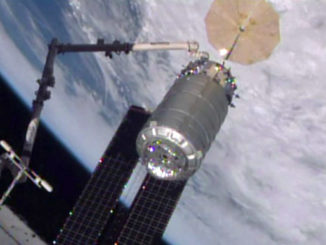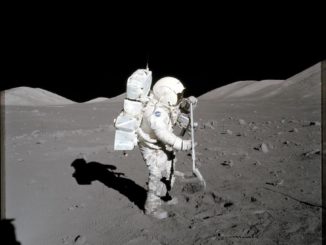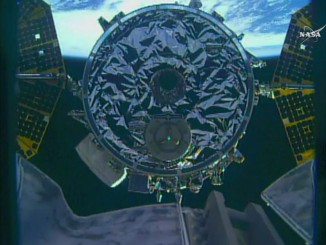STORY WRITTEN FOR CBS NEWS & USED WITH PERMISSION

Astronaut Scott Kelly, just back from a record 340-day stay aboard the International Space Station, is leaving NASA at the end of the month, but he said Friday he will continue participating in ongoing medical research to study the effects of long-duration spaceflight.
“I recently returned to our planet after traveling some 143,846,525 miles around our globe on a yearlong space mission that aims to push our limits as explorers,” Kelly said in a web posting. “Our universe is a big place, and we have many millions of miles yet to explore. My departure from NASA is my next step on that journey.
“Following my retirement, I will continue to participate in the ongoing research related to NASA’s one-year mission for as long as is necessary. … This year in space mission was a profound challenge for all involved that also gave me a unique perspective and a lot of time to reflect on what my next step should be on our continued journey to help further our capabilities in space and on Earth.”
Kelly’s post-NASA plans are not yet known, but he told reporters last week at the Johnson Space Center in Houston that “I’ll never be done with space. I will always be involved.”
“I doubt I would fly again with NASA, having the most time in space by any American,” he said. “We have so many talented people in our office there’s no reason to fly me again. They can fly somebody else who hasn’t had as much opportunity to do that.
“But I don’t think I would ever say I’m absolutely, 100 percent done, because I think there (are) a lot of exciting possibilities out there, maybe in the commercial (arena), certainly, and they might need a guy like me some day, or someone else, I don’t know. Maybe in the next 20 years, you’d be able to buy a cheap ticket, go for a little visit.”
Kelly and cosmonaut Mikhail Kornienko, joined by Russian Soyuz TMA-16M commander Gennady Padalka, blasted off from the Baikonur Cosmodrome in Kazakhstan on March 27, 2015, kicking off the longest flight yet by space station crew members.
Padalka returned to Earth last September while Kelly and Kornienko stayed aloft until March 1, landing on the steppe of Kazakhstan aboard the Soyuz TMA-18M spacecraft with commander Sergey Volkov.
Kelly logged seven days and 23 hours off planet during his first shuttle flight in 1999 and another 12 days and 18 hours during a second shuttle mission in 2007. He spent 159 days aboard the International Space Station in 2010-11.
Including his just-completed 340-day stay aboard the ISS, Kelly has logged a total of 520 days in space, making him the most experienced U.S. astronaut and moving him up to 17th in the world. Kornienko’s total stands at 516 days over two flights aboard the ISS, moving up to 18th on the list of most experienced astronauts and cosmonauts.
“My career with the Navy and NASA gave me an incredible chance to showcase public service to which I am dedicated and what we can accomplish on the big challenges of our day,” Kelly wrote.
“I am humbled and excited by new opportunities for me to support and share the amazing work NASA is doing to help us travel farther into the solar system and work with the next generation of science and technology leaders. I look forward to continuing my 30 years of public service in a new role.”
NASA Administrator Charles Bolden thanked Kelly for sacrificing “time with his loved ones, meals that don’t come in a bag, a cold beer, hot showers, cool autumn breezes, the sounds of birds chirping, the ability to lay his head on an actual pillow and so much more of the pleasures of life during his year of research and experimentation the International Space Station.”
“We will never forget the 700 stunning images he posted to social media, the leadership he demonstrated as ISS commander for the last six months and, most of all, the impact that all his missions and years of service will continue to have on our journey to Mars,” Bolden said.
While a record-setting mission for NASA, Kelly’s flight fell far short of records set by Russian cosmonauts in the days of the Mir space station. Four cosmonauts logged flights lasting a full year or more and one of them, Valery Polyakov, spent a record 438 days in space.
But Kelly and Kornienko are participating in a broad range of tests using state-of-the-art technology and sophisticated protocols far beyond those available in the 1990s, and scientists expect to gain valuable insights into how the human body is affected by the space environment and how some of those effects might be counteracted.
As an added bonus, Kelly’s twin brother Mark, a retired shuttle commander and husband of former Rep. Gabrielle Giffords, is participating in research to learn more about how long-duration spaceflight affects astronauts on a genetic level.
“Scott’s contributions to NASA are too many to name,” Brian Kelly, director of flight operations at the Johnson Space Center, said in NASA’s announcement. “In his year aboard the space station, he took part in experiments that will have far-reaching effects, helping us pave the way to putting humans on Mars and benefiting life on Earth.”
Kelly informed the astronaut office Thursday of his plans to leave NASA, sources said. He already is represented by Keppler Speakers, a company that represents many other former astronauts and space officials, including Mark Kelly.
Several shuttle veterans have found high-profile jobs in the commercial space sector in recent years. Jeff Ashby now works for Jeff Bezos’ Blue Origin rocket company, Garrett Reisman is a vice president at SpaceX, and Rick Sturckow is a test pilot with Richard Branson’s Virgin Galactic.
Frank Culbertson is a senior manager with Orbital ATK, Chris Ferguson, commander of the final shuttle mission, is overseeing Boeing’s efforts to build a crew ferry ship to carry astronauts to and from the space station, and both Ron Garan and Mark Kelly are working with World View, a company that plans to fly passengers to the edge of space aboard balloon-borne crew capsules.



